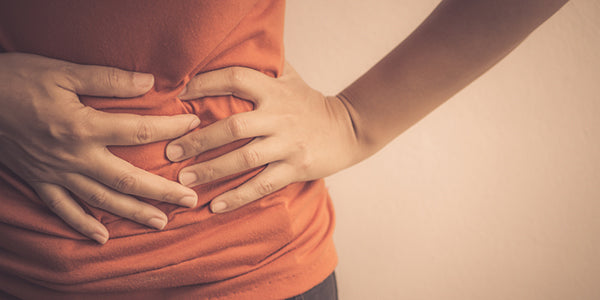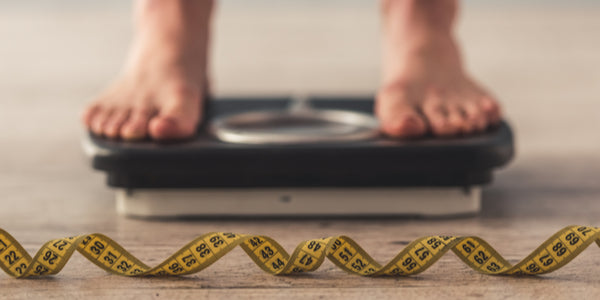
Bloated stomach after eating? Know that this is common and to not feel alone.
In fact, one in 10 Americans claims to suffer from a bloated stomach regularly. If always feeling bloated, also find comfort in knowing it can be prevented and managed.
From what causes bloating to what helps with bloating, this article is the ultimate guide for finding answers! Discover why bloating after eating happens and how to decrease bloating ahead.
Where Does Bloating Come From?
Bloat or bloating is a feeling of discomfort in the abdominal area. It is typically accompanied by the presence of one or more of the following symptoms:
• Gas
• Visible distention of the stomach
• Increase in abdominal width
• Pain
The most important thing to remember is that abdominal bloating is normal. In most cases, gas, bloat, and any associated pain will decrease with time and proper treatment. Bloating that lasts for an extended period of time should be discussed with a medical professional.
Why Bloating Happens
Anyone who has attended a large Thanksgiving meal or holiday dinner can attest that bloating or constipation can be a common consequence. Bloating may occur in the case of overeating as the digestive system breaks down food.
Digestion is a slow process that requires energy, fluids, and rest to happen properly. Sometimes, the human body does not receive enough support for easy digestion, especially if a meal is high in fat. Bloating is a signal that the body may be out of balance.
Bloating can begin for several reasons, including but not limited to:
• Swallowing air in excess
• Overeating
• Constipation
• Fluid retention
• Food intolerance or insensitivity
• Digestive disorder (i.e. inflammatory bowel disease, irritable bowel syndrome, gastroparesis, bowel obstruction)
Where Does Bloating Affect?
Bloating can be a sign of simply overeating, or it can indicate an even bigger problem. A more serious problem will likely mean more frequent bloating, such as daily or weekly occurrences. On the other hand, experiencing bloating occasionally is a normal experience.
When related to fluid retention, or a build-up of fluid in the body, bloating or water retention can be a sign of more serious, systemic conditions. These include issues related to:
• A circulatory system, body tissue, or body cavity fluid build-up
• Cardiovascular disease
• Changes in the lymphatic system
• Kidney insufficiency
• Pregnancy
• Physical inactivity
• Medication misuse or contraindication
• Salt imbalances
• Hormone imbalance
Can Bloating Be Painful?
Bloating can cause intense abdominal pain, especially if it is ignored over time. Often, a small but impactful lifestyle and diet adjustment can ease common bloating problems.
A bloating belly is not meant to be a permanent sidekick. Instead, it signals an area where the body's digestive process can be improved. Many times, an individual will find home remedies or natural solutions that make maintaining gut health easier.
If bloating is getting worse, or if one begins bloating after eating anything (not just "trigger foods"), discuss possible causes with a doctor and dietitian.
Bloating Treatment & Management
Bloating and gas after eating can be extra uncomfortable, especially if company is over for dinner. With many possible causes, the best way to make bloating disappear is to discover and directly treat the cause.
Commonly recommended treatments include:
• Limiting salt intake
• Increasing exercise
• Altering medications if able
• Managing related conditions (i.e. heart, kidney)
Bloating Home Remedies
Got bad bloat? There are many home and natural remedies that may counteract common causes of bloating, including these tips:
• Limit gum chewing
• Limit carbonated drinks
• Chew with mouth closed
• Slow eating during mealtime
• Avoid using a straw
• Stick to suggested serving sizes
• Drink more water and stay hydrated
• Eat intuitively (based on hunger cues rather than impulse or temptation)
• Increase fiber in the diet (i.e. whole grains, fresh produce)
• Regulate digestion with routine physical activity
• Take a daily probiotic
Bloating Pain Relief
The pain that comes from bloating can also be indicative of a food intolerance or sensitivity. Digestive disorders, such as lactose intolerance, can also cause bloating as a type of digestive discomfort.
The best solutions suggested by experts for eradicating these kinds of bloat are to:
• Track dietary patterns in a food diary
• Remove primary trigger food(s)
• Visit a diagnosis-specific dietitian (i.e. ask an IBD dietitian about low-fiber diet options)
• Manage the specific disorder itself
• Lifestyle changes
• Adjust medication(s)
• Eat a well-balanced diet
• Limit concentrated sugar(s) and sugar alcohols/substitutes
The Bottom Line on Bloating
A bloating belly is no fun. While there are many possible causes, the treatment is almost always the same. For many people, the key to treating bloating pain or related symptoms is to put good gut health habits in place.
References:
Coldwell M. Nutrition and Bloating: What You Need to Know. Ignite Nutrition. Published February 6, 2019. https://ignitenutrition.ca/blog/nutrition-and-bloating/.
Weeks C. 10 Reasons You're Constantly Bloated, According to a Dietitian. Eat This, Not That! Published September 2, 2020. https://www.eatthis.com/what-causes-bloating/.
Zwarte DD. Proven Ways to Reduce Bloating; Dietitian shares her top 17 tips to help stop bloating. Didititian. Published 2020. https://www.didititian.com/proven-ways-to-reduce-bloating-dietitian-shares-her-top-17-tips-to-help-stop-your-bloating/.







